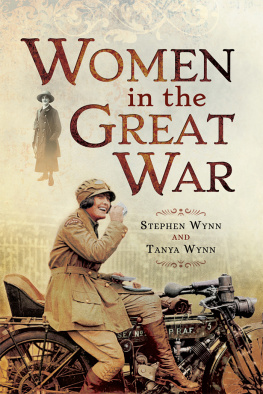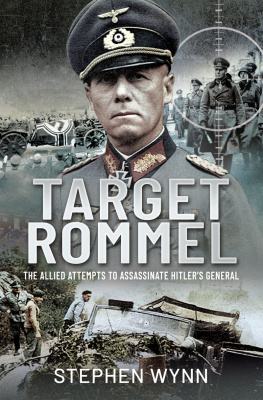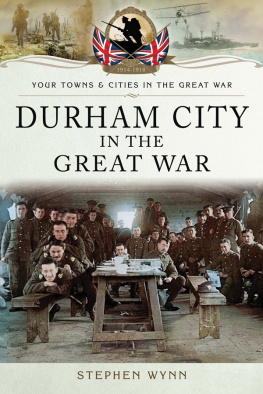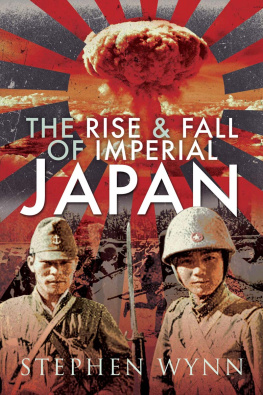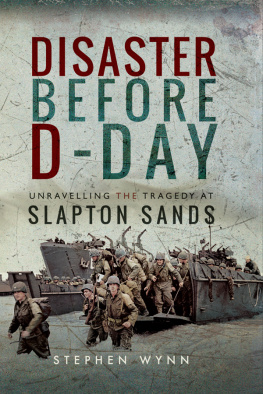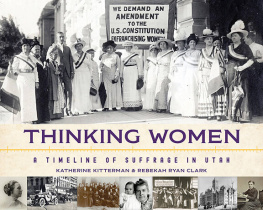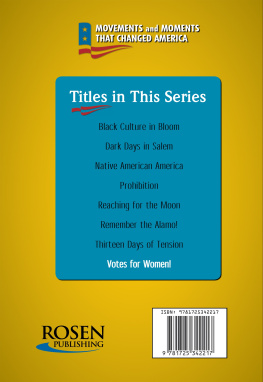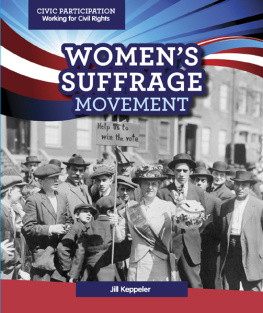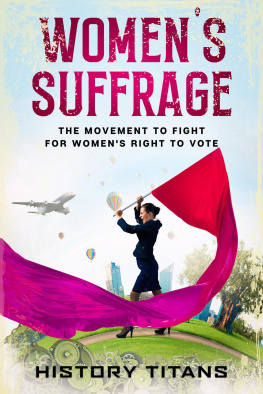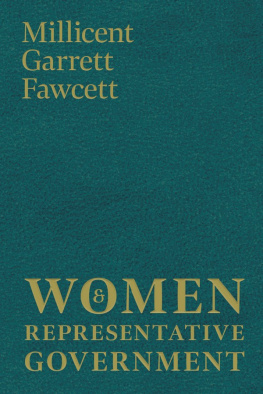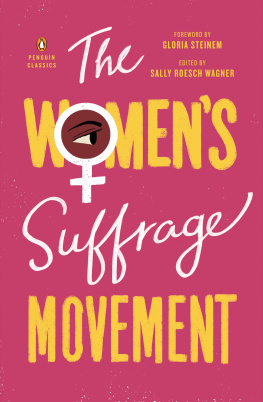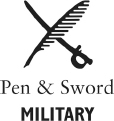
Women in the Great War
Women in the Great War
Stephen Wynn
&
Tanya Wynn
First published in Great Britain in 2017 by
PEN & SWORD MILITARY
an imprint of
Pen & Sword Books Ltd
47 Church Street
Barnsley
South Yorkshire
S70 2AS
Copyright Stephen Wynn and Tanya Wynn, 2017
ISBN 978-1-47383-414-9
eISBN 978-1-47386-541-9
Mobi ISBN 978-1-47386-540-2
The right of Stephen Wynn and Tanya Wynn to be identified as the authors of this work has been asserted by them in accordance with the Copyright, Designs and Patents Act 1988.
A CIP catalogue record for this book is available from the British Library.
All rights reserved. No part of this book may be reproduced or transmitted in any form or by any means, electronic or mechanical including photocopying, recording or by any information storage and retrieval system, without permission from the Publisher in writing.
Pen & Sword Books Ltd incorporates the imprints of Pen & Sword Archaeology,
Atlas, Aviation, Battleground, Discovery, Family History, History, Maritime,
Military, Naval, Politics, Railways, Select, Social History, Transport, True Crime,
and Claymore Press, Frontline Books, Leo Cooper, Praetorian Press,
Remember When, Seaforth Publishing and Wharncliffe.
For a complete list of Pen & Sword titles please contact
PEN & SWORD BOOKS LIMITED
47 Church Street, Barnsley, South Yorkshire, S70 2AS, England
E-mail:
Website: www.pen-and-sword.co.uk
ABOUT THE AUTHORS
Stephen and Tanya have been together for the last fourteen years. Initially their shared interest was their four German Shepherd dogs but when Stephen caught the writing bug in 2010, Tanya was a big influence on his first book: Two Sons in a Warzone Afghanistan: The True Story of a Fathers Conflict . Stephen kept a diary whilst his sons were both serving in Afghanistan during 2008. But it was just that, a diary, full of his innermost feelings and thoughts, of reading letters, speaking on the telephone and intently watching the evening news. One day whilst on holiday, Tanya suggested Why dont you turn it in to a book? So he took her advice.
After this, Stephen simply never stopped writing. He collaborated with one of his writing partners, Ken Porter, on a book published in August 2012, German POW Camp 266 Langdon Hills , which spent six weeks as the number one best-seller in Waterstones, Basildon in 2013. Stephen and Ken collaborated on a further four books in the Towns & Cities in the Great War series by Pen & Sword. Stephen has also written other titles for the same series.
Since then he has co-written three crime thrillers, published between 2010 and 2012, which feature a fictional detective named Terry Danvers. He has also written a novella based on a Second World War prisoner of war camp which features a mysterious diary.
With this new joint venture, apart from walking their dogs early each morning when most sensible people are still fast asleep, Stephen and Tanya now have another common interest.
CHAPTER ONE
WOMEN IN GENERAL
The First World War, or the Great War as it was initially referred to, was undoubtedly responsible for a big change in the lives of British women, but it was not the sole reason behind their eventual emancipation. There had been many moves made by women to change and improve their lot in life, at all levels of society, as far back as the 1880s.
The Womens Social and Political Union (WSPU), had been founded in 1903 by mother and daughter, Emmeline and Christabel Pankhurst, eleven years before the war started.
Better known as the Suffragettes, they fought for a better life and a better world for women, which was no easy thing to achieve in a time when they were seen by male dominated British society as nothing more than radical campaigners. The politicians of the day, who were all men, had not yet grasped the advantages of embracing women on equal terms and the benefits that would come with such an approach. Instead they used as their excuse for not engaging with or supporting them, the sometimes violent methods employed by the suffragettes to further their cause.
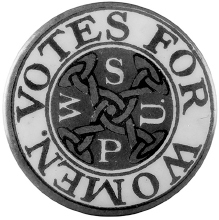
Womens Social and Political Union logo.
In essence, at the time of the First World War, women were generally regarded as second class citizens, who should know their place in life and, so far as politicians were concerned, were hardly worthy of negotiations or concessions.
With few exceptions, work deemed suitable for women, was associated with domestic service, shop work or the teaching of primary age children. Once a woman had married, not only was she seen as being the property of her husband, but she was expected to stop working, bear him children, look after the home and be a dutiful and obedient wife. At the time the word obey was part of a womans wedding vows and taken more literally than it is today.
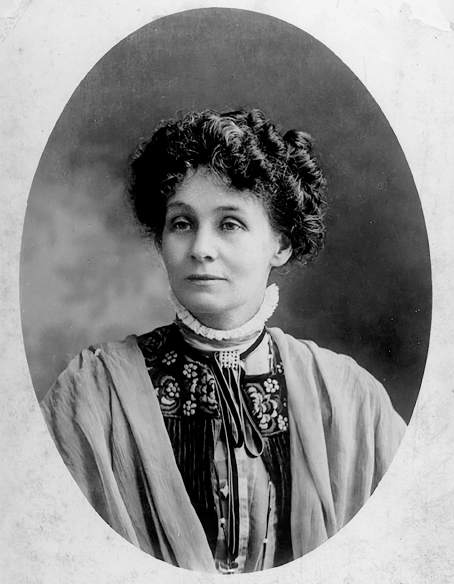
Emmeline Pankhurst.
History records that the First World War was a massive stepping stone in the long and sometime arduous journey towards equality for women, in all aspects of social and domestic life. The suffrage movement was undoubtedly the catalyst which originally lit the beacon of hope for a better tomorrow for all women, but it was the varied demands of the First World War, which provided women with the platform and opportunity to be able to showcase their new found plethora of skills and attributes, which largely layed the foundation of where they are today. Even politicians managed to grasp the importance of what women had achieved for their country during the war, and how beneficial their presence in a post war Great Britain, would be.
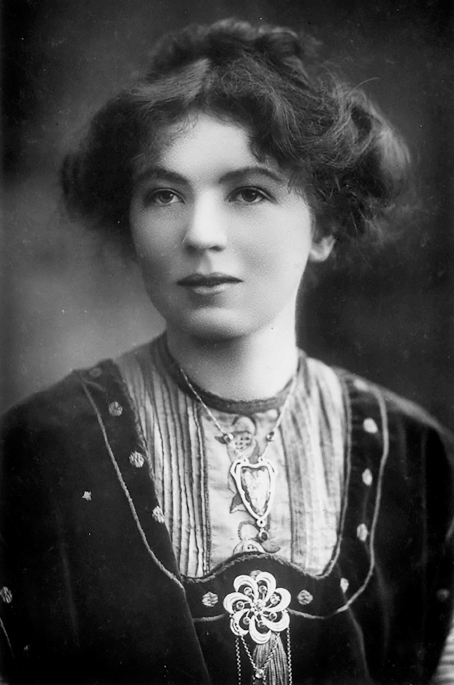
Christabel Pankhurst.
With the outbreak of the war a deal was struck between the government and the leadership of the Womens Social and Political Union, which saw all incarcerated suffragettes released from prison, as well as a sum of 2,000 paid to the movement in exchange for their support of the war and their encouragement of men to enlist in the army. To this end Emmeline and Christabel organised a rally in London, attended by an estimated 30,000 women.
Some of the organisations members saw this as a total betrayal of everything which they collectively stood for, but the Pankhursts saw a wider picture of more jobs being available for women in the short term as well as a better tomorrow in the long term. There was the added advantage that if women showed the value of their support for the war both on the Home Front as well as on the battlefields of Europe and beyond, then there was every possibility that the time when they would finally have the right to vote, would come earlier than it otherwise might have been. It has been estimated that between 1914 and 1918, some 2 million women replaced men in the workplace, thus making those men available to serve in the armed forces.
In August 1914, men from all walks of life and from all parts of the country, left their jobs and families to go and fight. Some did it for their king and country, others did it out of honour and a heartfelt desire to do their duty, whilst there were those who saw the war as an adventure, one that saved them from a life of eternal drudgery. No matter what their reasons, the jobs they left behind still needed to be done. It was as a result of this environment that womens lives would be changed for ever.

